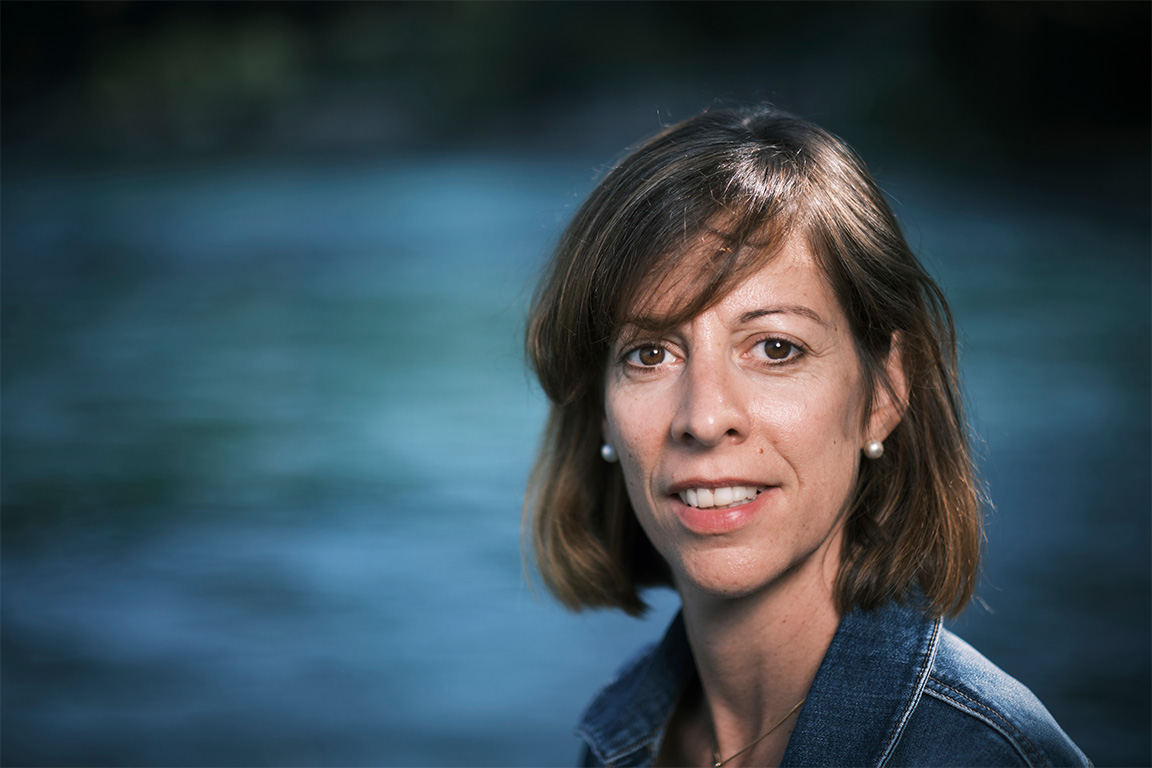Political science
Moving slowly towards an environmental law
What is politics doing to make the environment a better place? Political scientist Karin Ingold is examining which processes and mechanisms lead to a new law. She freely admits that it is often non-political influences that bring about changes in behavior or stricter legislation.

Residue from medicines, cosmetics, pesticides and detergents – none of them are sufficiently retained in conventional wastewater treatment plants. That is a problem because the organic trace elements, referred to as micropollutants, can cause harm to fish and other living organisms. What science recognized in the 1990s flowed into the political process: In 2016, the Federal Council decided to set up a fund to finance an overhaul of the 100 largest Swiss wastewater treatment plants by 2040.
Climate change is nothing newScience identifies a problem, develops a solution with the administration, and then hands it on to politicians who, at the end of the day, make the necessary decision: “That is how the textbooks present the interaction of the various players,” says Karin Ingold. And it is this interaction of a vital environment and the mechanisms of politics that fascinate the professor at the Institute of Political Science at the University of Bern. At the beginning of her academic career, she could not decide whether she wanted to focus more on nature or on policy monitoring. But now she is doing a balancing act and focusing on both: Her chair for Policy Analysis and Environmental Governance [PEGO] at the Institute of Political Science is not only based in Bern but is also embedded within the Environmental Social Sciences Department of EAWAG in Dübendorf, i.e. the Aquatic Research Institute of the ETH. So she is in fact close to both science and engineering. At the same time, she can take a scientific approach to investigating how people react to environmental problems. The fact that she is also Vice President of the Oeschger Centre for Climate Change Research (OCCR) shows just how important climate issues are to her. And it is the word climate that triggers an expression of frustration: People have known that climate change was real for 30 years now. “But very little has been done since then, both at a personal level and in politics.” That’s why she is very honest with her students, telling them they will be working hard on a pretty depressing topic.
Analyses on the PC and discussions in the fieldThe example of micropollutants is good for the textbook but is not representative for the course of environmental regulation in the particularly slowly grinding mills of Swiss politics. In direct democracy, “Arguments take time.” Ingold takes it in her stride and also sees advantages in the sluggish pace politics is sometimes seen as having. Because once something has been introduced here, it’s unlikely to be reversed quickly. “The broad acceptance thus achieved then helps implementation. The majority of the population doesn’t need convincing of the logic of lead-free gasoline or speed limits,” says a convinced Ingold. Together with her team, she carefully examines and analyses these processes, usually at her desk and in front of her PC. But she also appreciates personal contact. She meets with people from the cantonal and communal administration, has an expert explain the drinking water problem of a rural community, and listens to a farmer telling her about the hardships they would face if certain pesticides were banned.
She also regularly compares notes with environmental minister Simonetta Sommaruga. What is necessary in terms of climate protection has been well known for some time. But the road there is a stony one. Examining how an environmental law found a majority in the past could help. This is where Ingold’s experience comes in, as she knows that science has completely different rules and rhythms from politics – and that politics works completely differently from administration. You need an in-depth understanding of the different systems to make a collaboration possible. Only then, can you start working towards successful environmental regulation.
Political forecasts and a hard jobClimate, biodiversity, energy and water shortage: There are plenty of environmental risks and thus research objects. Ingold knows that technology itself is not the answer. Setting up a new task force for a newly detected problem, along the lines of the coronavirus pandemic scenario, could help in individual cases. “But it is always about people being able to work well together.” Environmental organizations, society and business would have to be represented in such interdisciplinary teams. At the end, politics has to take care of prioritizaton.

But that’s one of the things about politics. Topical subjects are attractive to make a name for yourself. But political players may as yet have no opinions about it or even change their mind. This naturally makes the analysis of the political process more complicated. This is why Ingold and her institute are at their most successful when they have to analyze processes retrospectively and show how a decision was made – in Switzerland, normally a compromise. It is considerably more demanding and also more in demand to make predictions and model a political process of the future and develop scenarios.
Climate policy needs social sciencesShe was shown great recognition for her discipline at the start of the year by being made President of ProClim. The Forum for Climate and Global Change illustrates that social sciences play an integral role when it comes to finding ways out of the climate crisis. For Ingold, this step shows that the circle, which is strongly influenced by the natural sciences, is opening up, working in an interdisciplinary manner and thus also taking into consideration the needs and functioning of society. Ingold not only wants to deal with her research object differently from in the past but also with her students: “In academic circles, there is a lot of criticism - that’s just the way it is.” She herself has, throughout her career, repeatedly been faced with people who not only criticized but also encouraged the up-and-coming professor and strengthened her. “Praise is incredibly important. That’s something I have taken to heart and I do try to praise my students on a more regular basis.”
Politics can’t explain everythingNatural laws and scientific findings are crystal clear but politics and society regularly couldn’t give a damn about them. That is frustrating when it comes to climate protection. But there are also pleasant surprises, for example the rapid increase in electromobility and the trend towards vegetarianism and veganism which aren’t controlled by politics either. “Such developments show that politics is just one of several drivers when it comes to ecological progress. Social trends, economic developments and catastrophes, for example, are significant,” says the researcher somewhat humbly of her research object. The way Switzerland turned its back on nuclear power on May 25, 2011, for example, also provided lessons in modesty. It wasn’t building site occupations, decades of bickering at the ballot box or stubborn opposition to a repository for radioactive waste that tipped the balance, but the nuclear disaster in Fukushima: Just ten weeks after the devastation in Japan, the then energy minster Doris Leuthard convinced the Federal Council to gradually turn its back on nuclear power.
About
Karin Ingold
Prof. Dr. Karin Ingold is Professor of Policy Analysis and Environmental Governance at the Institute
of Political Science at the University of Bern.
Contact: karin.ingold@unibe.ch
New magazine uniFOKUS

Subscribe free of charge now!
This article first appeared in uniFOKUS, the new University of Bern print magazine. Four times a year, uniFOKUS shows what academia and science are capable of. Thematically, each issue focuses on one specialist area from different points of view and thus aims to bring together as much expertise and as many research results from scientists and other academics at the University of Bern as possible.
The online magazine of the University of Bern

Subscribe to the uniAKTUELL newsletter
The University of Bern conducts cutting-edge research on topics that concern us as a society and shape our future. In uniAKTUELL we show selected examples and introduce you to the people behind them – gripping, multimedia and free of charge.